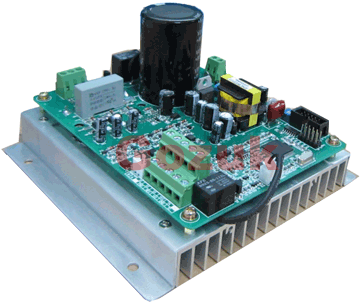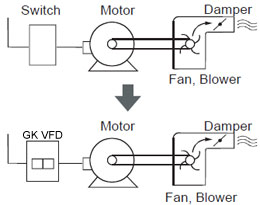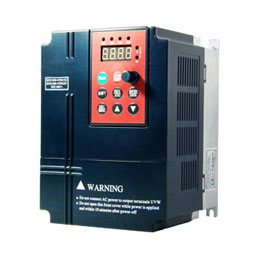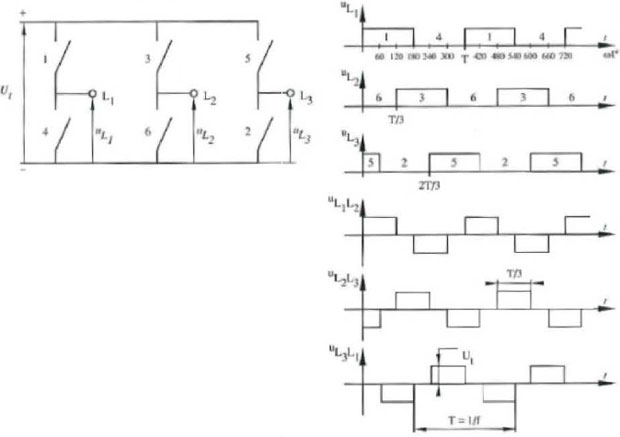Home » Troubleshooting » Variable frequency drive DC Bus overvoltage fault
Variable frequency drive DC Bus overvoltage fault
Put a braking resistor on variable frequency drive. If the VFD has provisions for DC Bus voltage control utilizing an external resistor, buy the resistor and install it. If the variable frequency drive does not have that control, it can be added as an option package on most drive models. Otherwise the only way to compensate for this is to change the variable frequency drive parameters to prevent the VFD from decelerating the motor too quickly causing the regeneration which jacks up the bus voltage.
For the most part and reading the VFD manual is the first step for sure. The DC Braking Resistor may be the simplest fix IF the variable frequency drive in question has the 7th IGBT on board. If not, there are 3rd party manufacturers for an external Braking Transistor, but it and the Resistor do need to be sized correctly for the drive and the application Duty Cycle of the regen/overhauling the VFD drive is seeing.
My questions are, What is the application? What is the input (Line) Voltage? Is the VFD drive configured for that Voltage? If you are running High input voltage, a 3% or 5% Line Reactor may be the solution.
Other questions are, When does the VFD trip on DC Bus Over Voltage? At initial power up of the unit? During acceleration? During running at reference speed? During deceleration?
The remedy may be as simple as extending the deceleration time, or reducing the DC Bus regulation level. Most VFDs have a fairly good DC Bus regulator, but they are generally set at the maximum which effectively "Turns Off" the regulator so it is unable to regulate.
Hope these questions help you to find the root cause of your VFD faults.
For the most part and reading the VFD manual is the first step for sure. The DC Braking Resistor may be the simplest fix IF the variable frequency drive in question has the 7th IGBT on board. If not, there are 3rd party manufacturers for an external Braking Transistor, but it and the Resistor do need to be sized correctly for the drive and the application Duty Cycle of the regen/overhauling the VFD drive is seeing.
My questions are, What is the application? What is the input (Line) Voltage? Is the VFD drive configured for that Voltage? If you are running High input voltage, a 3% or 5% Line Reactor may be the solution.
Other questions are, When does the VFD trip on DC Bus Over Voltage? At initial power up of the unit? During acceleration? During running at reference speed? During deceleration?
The remedy may be as simple as extending the deceleration time, or reducing the DC Bus regulation level. Most VFDs have a fairly good DC Bus regulator, but they are generally set at the maximum which effectively "Turns Off" the regulator so it is unable to regulate.
Hope these questions help you to find the root cause of your VFD faults.
the VFD trips during acceleration with dc over voltage, and I extended acceleration time but the problem doesnt disappeared
Post a Comment:
You may also like:
Featured Articles
Non-Enclosure Variable Frequency Drive ...
 No enclosure (cover), reducing installation space and cost effective. Widely used in All-In-One control cabinet. Keep the same ...
No enclosure (cover), reducing installation space and cost effective. Widely used in All-In-One control cabinet. Keep the same ...
 No enclosure (cover), reducing installation space and cost effective. Widely used in All-In-One control cabinet. Keep the same ...
No enclosure (cover), reducing installation space and cost effective. Widely used in All-In-One control cabinet. Keep the same ...Variable frequency drive application ...
 Variable Frequency Drive (VFD) can be used in lots of fields. Variable frequency drives are widely used to control the speed of ...
Variable Frequency Drive (VFD) can be used in lots of fields. Variable frequency drives are widely used to control the speed of ...
 Variable Frequency Drive (VFD) can be used in lots of fields. Variable frequency drives are widely used to control the speed of ...
Variable Frequency Drive (VFD) can be used in lots of fields. Variable frequency drives are widely used to control the speed of ...Variable frequency drive in HVAC ...
 Variable frequency drives (VFD) have been used for HVAC systems in buildings for more than 40 years. But only in recent years, ...
Variable frequency drives (VFD) have been used for HVAC systems in buildings for more than 40 years. But only in recent years, ...
 Variable frequency drives (VFD) have been used for HVAC systems in buildings for more than 40 years. But only in recent years, ...
Variable frequency drives (VFD) have been used for HVAC systems in buildings for more than 40 years. But only in recent years, ...Variable Frequency Drive Harmonics and ...
A discussion of the benefits of variable frequency drives often leads to a question regarding electrical harmonic distortion ...
Three phase inverters
 In the variable frequency drive rectifier paper, it explains how to go from three phase alternating current voltage to a direct ...
In the variable frequency drive rectifier paper, it explains how to go from three phase alternating current voltage to a direct ...
 In the variable frequency drive rectifier paper, it explains how to go from three phase alternating current voltage to a direct ...
In the variable frequency drive rectifier paper, it explains how to go from three phase alternating current voltage to a direct ...
VFD manufacturers
